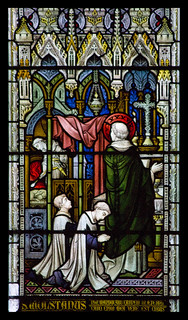Saint Wulstan, Bishop, Religious
St Wulstan became a Benedictine monk at Worcester Cathedral priory, and later was made prior. He reformed the monastic observance, and became known as a preacher and counsellor.
In 1062 he became Bishop of Worcester and combined effectively the tasks of monastic superior and diocesan bishop. He is the first English bishop known to have made a systematic visitation of his diocese. Together with Lanfranc he was instrumental in abolishing the slave trade from Bristol to Viking Ireland, and later he supported Lanfranc’s policy of reform. He built parish churches and re-founded the monastery at Westbury-on-Trym. He insisted on clerical celibacy, and under him Worcester became one of the most important centres of Old English literature and culture. He was known for his abstinence and generosity to the poor.
After the Norman Conquest he remained one of the few Englishmen to retain office. In the Barons’ Rising he was loyal to the Crown and defended the Castle of Worcester against the insurgents. He was buried in his Cathedral, and his cult began almost at once. He was canonised in 1203 and his feast was widely kept in monastic and diocesan calendars.

St Wulstan and the Goose - Window at Downside Abbey
In the Chapel of St Oliver Plunkett at Downside Abbey, a stained glass window depicts a less official story concerning Wulstan: that one day, whilst celebrating Mass, he was distracted by the smell of roast goose, which was wafted into the church from the neighbouring kitchen. He prayed that he might be delivered from the distraction and vowed that he would never eat meat again if his prayer were granted.
The modern world needs stories like this more than it realises. The watered-down puritanism that serves so many of us as a moral code today equates pleasure with evil – cream cakes, the advertisements tell us, are “naughty but nice”.. or even “wickedly delicious.” Messages like this are a libel on the name of God, who created the pleasures, and on his Son, whose first recorded public act was turning water into wine. There is nothing wicked about delicious food in itself, or in any other pleasant or beautiful thing. Let us enjoy God’s creation all we can and rejoice in its creator as we do so, and if, like Wulstan, we have to deprive ourselves of something for our spiritual or bodily health, then let us suffer our deprivation cheerfully, blaming the weakness in us that made it necessary. Let us never devalue our sacrifices by denigrating the things we sacrifice, or the sacrifice will be pointless. Let us remember what God did, day after day, as he was creating the world: he looked at it, and saw it, and behold: it was very good.
Post Views: 28
